For the 2025 school year, there is 1 public preschool serving 254 students in Jay School Corporation School District. This district's average pre testing ranking is 9/10, which is in the top 20% of public pre schools in Indiana.
Public Preschool in Jay School Corporation School District have an average math proficiency score of 57% (versus the Indiana public pre school average of 43%), and reading proficiency score of 57% (versus the 39% statewide average).
Minority enrollment is 6% of the student body (majority Hispanic), which is less than the Indiana public preschool average of 36% (majority Hispanic).
Overview
This School District
This State (IN)
# Schools
6 Schools
605 Schools
# Students
2,987 Students
264,424 Students
# Teachers
216 Teachers
17,629 Teachers
Student : Teacher Ratio
14:1
14:1
District Rank
Jay School Corporation School District, which is ranked within the top 50% of all 394 school districts in Indiana (based off of combined math and reading proficiency testing data) for the 2021-2022 school year.
The school district's graduation rate of 83% has decreased from 96% over five school years.
Overall District Rank
#132 out of 400 school districts
(Top 50%)
(Top 50%)
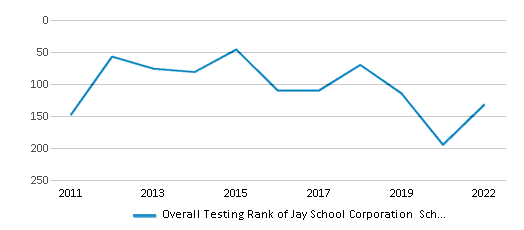
Math Test Scores (% Proficient)
44%
38%
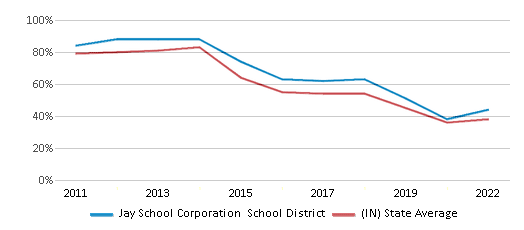
Reading/Language Arts Test Scores (% Proficient)
42%
41%
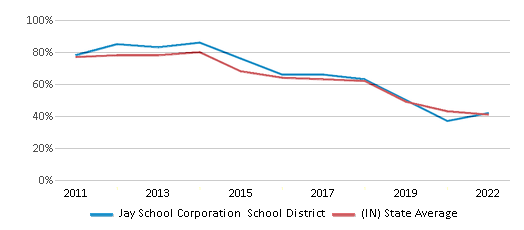
Science Test Scores (% Proficient)
32%
34%
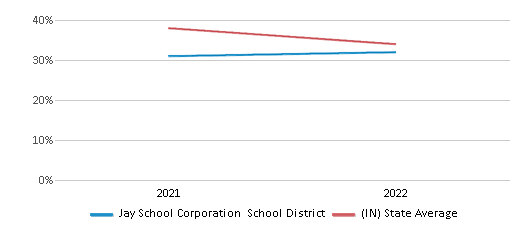
Graduation Rate
83%
88%
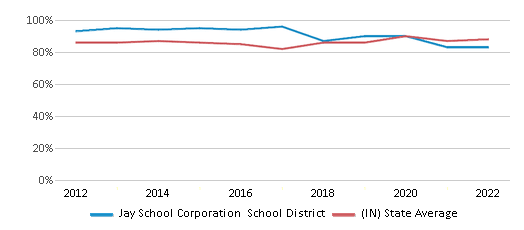
Students by Ethnicity:
Diversity Score
0.20
0.56
# American Indian Students
3 Students
409 Students
% American Indian Students
n/a
n/a
# Asian Students
14 Students
7,922 Students
% Asian Students
n/a
3%
# Hispanic Students
235 Students
39,591 Students
% Hispanic Students
8%
15%
# Black Students
16 Students
30,755 Students
% Black Students
1%
12%
# White Students
2,663 Students
169,241 Students
% White Students
89%
64%
# Hawaiian Students
1 Student
312 Students
% Hawaiian Students
n/a
n/a
# Two or more races Students
55 Students
16,194 Students
% of Two or more races Students
2%
6%
Students by Grade:
# Students in PK Grade:
55
22,837
# Students in K Grade:
257
40,190
# Students in 1st Grade:
220
40,513
# Students in 2nd Grade:
255
40,311
# Students in 3rd Grade:
251
37,170
# Students in 4th Grade:
220
37,119
# Students in 5th Grade:
233
27,784
# Students in 6th Grade:
215
11,600
# Students in 7th Grade:
259
1,191
# Students in 8th Grade:
214
1,197
# Students in 9th Grade:
203
1,093
# Students in 10th Grade:
208
1,194
# Students in 11th Grade:
192
1,100
# Students in 12th Grade:
197
1,012
# Ungraded Students:
8
113
District Revenue and Spending
The revenue/student of $14,009 is higher than the state median of $13,222. The school district revenue/student has stayed relatively flat over four school years.
The school district's spending/student of $12,667 is less than the state median of $12,852. The school district spending/student has stayed relatively flat over four school years.
Total Revenue
$42 MM
$13,615 MM
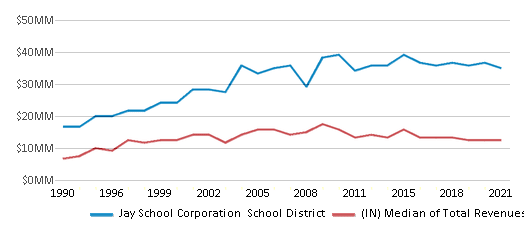
Spending
$38 MM
$13,234 MM
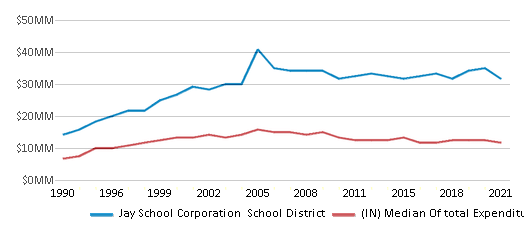
Revenue / Student
$14,009
$13,222
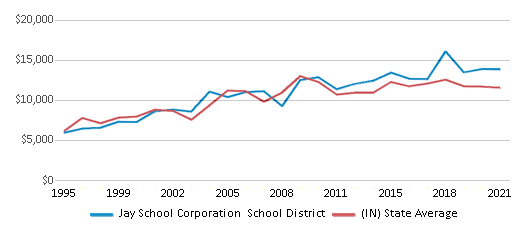
Spending / Student
$12,667
$12,852
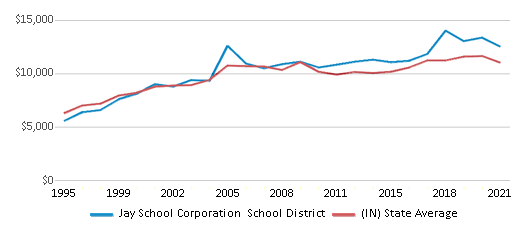
Best Jay School Corporation School District Public Preschools (2025)
School
(Math and Reading Proficiency)
(Math and Reading Proficiency)
Location
Grades
Students
Rank: #11.
Redkey Elementary School
(Math: 55-59% | Reading: 55-59%)
Rank:
Rank:
9/
Top 20%10
Box 6 W Main St
Redkey, IN 47373
(765) 369-2571
Redkey, IN 47373
(765) 369-2571
Grades: PK-6
| 254 students
Recent Articles

Year-Round Or Traditional Schedule?
Which is more appropriate for your child? A year-round attendance schedule or traditional schedule? We look at the pros and cons.

Why You Should Encourage Your Child to Join a Sports Team
Participating in team sports has a great many benefits for children, there is no doubt. In this article you will learn what those benefits are.

White Students are Now the Minority in U.S. Public Schools
Increasing birth rates among immigrant families from Asia and Central and South America, combined with lower birth rates among white families, means that for the first time in history, public school students in the United States are majority-minority. This shift in demographics poses difficulties for schools as they work to accommodate children of varying language abilities and socio-economic backgrounds.





